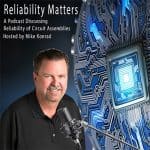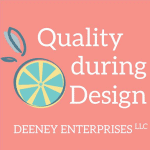
Are Silos an Issue?
Abstract
Dianna and Fred discuss workplace politics: are silos an issue?
ᐅ Play Episode
Your Reliability Engineering Professional Development Site
by Dianna Deeney Leave a Comment

Dianna and Fred discuss workplace politics: are silos an issue?
ᐅ Play Episode
by Christopher Jackson Leave a Comment

Chris and Fred discuss why the Physics of Failure (PoF) is hard to model? … or is it?
ᐅ Play Episode
by Michael Pfeifer, Ph.D., P.E. Leave a Comment

Phase diagrams are graphical representations of the phases present in a particular alloy being held at a particular temperature. Phase diagrams are used to predict the phase changes that occur in alloys during heating and cooling. This can be during heat treating, casting solidification, joining processes that involve molten metal, and elevated temperature use conditions. This is important because the properties of a metal component depend on the phases present in the metal.
In this episode Michael discusses phase diagrams and their use.
To learn more about phase diagrams check out this video and article.
by Wim Vancauwenberghe Leave a Comment

In this episode of the Asset Performance podcast, join us as we sit down with Stephen Timms and Ty Levine from Sigga, an independent software vendor specializing in connected worker solutions for maintenance organizations, particularly those using SAP. Host Wim Vancauwenberghe explores Sigga’s mission to elevate maintenance technicians as unsung heroes within organizations.
by Fred Schenkelberg Leave a Comment

Calculating and interpreting the process capability ratios is the easy part. Getting valid results takes more work and thinking. Knowing that the process is capable is only one use of this information. We should also use the information contained in these ratios to inform product design tolerance. [Read more…]
by Mike Konrad Leave a Comment

We’ve discussed the silver tsunami on the show numerous times, the unprecedented rate of which employees are retiring. When engineers and other employees retire from companies, they take with them more than a set of gold cufflinks or an engraved plaque. In many cases, they also take with them wisdom and knowledge.
Perhaps this is never more true than in the case of my guest today. And who is that? My friend and colleague Doug Pauls.
by Christopher Jackson Leave a Comment

Chris and Fred discuss the MTBF … again. And again. People don’t (want to) get it. So here we go again …
ᐅ Play Episode

Kirk and Fred discuss new product market release schedule pressures, and then after customers start finding reliability issues, the actual firefighting begins. Many times, those who quickly can fix the causes of failures, the firefighters, get many more accolades than those who find and mitigate product weaknesses that become failures during the design and development phase.

Kirk and Fred discuss the challenge of showing those new to limit discovery using HALT and proving does find relevant future field issues that either already have occurred in a new released product, or in a product under development.
ᐅ Play Episode


We explore the history, philosophy, and methodology of Design for Six Sigma (DFSS) and explore how it relates to Quality during Design (hint: they’re not the same).
We dissect the acronyms DMAIC and DMADV, revealing how these methodologies are blueprints for achieving excellence. From statistics to Motorola’s legendary quality standards and other history of six sigma, you’ll begin to see how DFSS may relate with your organization’s current design development processes.
Quality during Design is not DFSS. It can be part of DFSS or any other product development process. Quality during Design is a philosophy that emphasizes the benefits of cross-functional team involvement and a methodology that uses quality tools to refine design concepts early on. Quality tools bridge the gap between team communication and innovative concept development. We review why skipping the crucial steps of questioning and investigating can lead to missed opportunities.
As we navigate through the essential stages of product development, we invite you to join us on this enlightening path to creating impactful and high-quality solutions that stand the test of time—and the marketplace.
by Christopher Jackson 2 Comments

Chris and Fred discuss how we go about modeling the reliability of systems … particularly with things called ‘block diagrams.’ Might this help you?
ᐅ Play Episode
by Christopher Jackson 2 Comments

Chris and Fred discuss where the ideas of ‘confidence bounds’ come from … and perhaps what they mean.
ᐅ Play Episode
by Carl S. Carlson Leave a Comment

Carl and Fred discuss their overall approach to FMEA, what works and doesn’t work.
ᐅ Play Episode
by Dianna Deeney Leave a Comment

In the realm of risk assessment and management, traditional tools like Failure Mode and Effects Analysis (FMEA) and risk matrices have been widely accepted as the norm. However, beneath the surface of these established methods lie hidden flaws of FMEA and risk matrices that can significantly impact the effectiveness of risk analysis and decision-making processes. The latest podcast episode takes a deep dive into these issues, offering listeners an exploration of the challenges posed by conventional risk assessment techniques.
The episode emphasizes the importance of staying informed and adapting to new methods in the ever-evolving landscape of risk management. By doing so, professionals can ensure that they are not only equipped to handle current challenges but also prepared to meet the demands of the future.
by Christopher Jackson Leave a Comment

Sometimes the equations we need to model reliability are just so complicated that we simply avoid them, or use other equations that are simpler but model the wrong thing (see some of my earlier webinars!). But it doesn’t have to be this way. Monte Carlo simulation is so simple that anyone who has access to Microsoft Excel can use it. What this means is that we don’t need to use complicated equations (like those use to model things like switching systems) and instead can use Microsoft Excel to help us get approximate (but really accurate) answers. Sound interesting? Join us for this webinar!
[Read more…]
 Ask a question or send along a comment.
Please login to view and use the contact form.
Ask a question or send along a comment.
Please login to view and use the contact form.